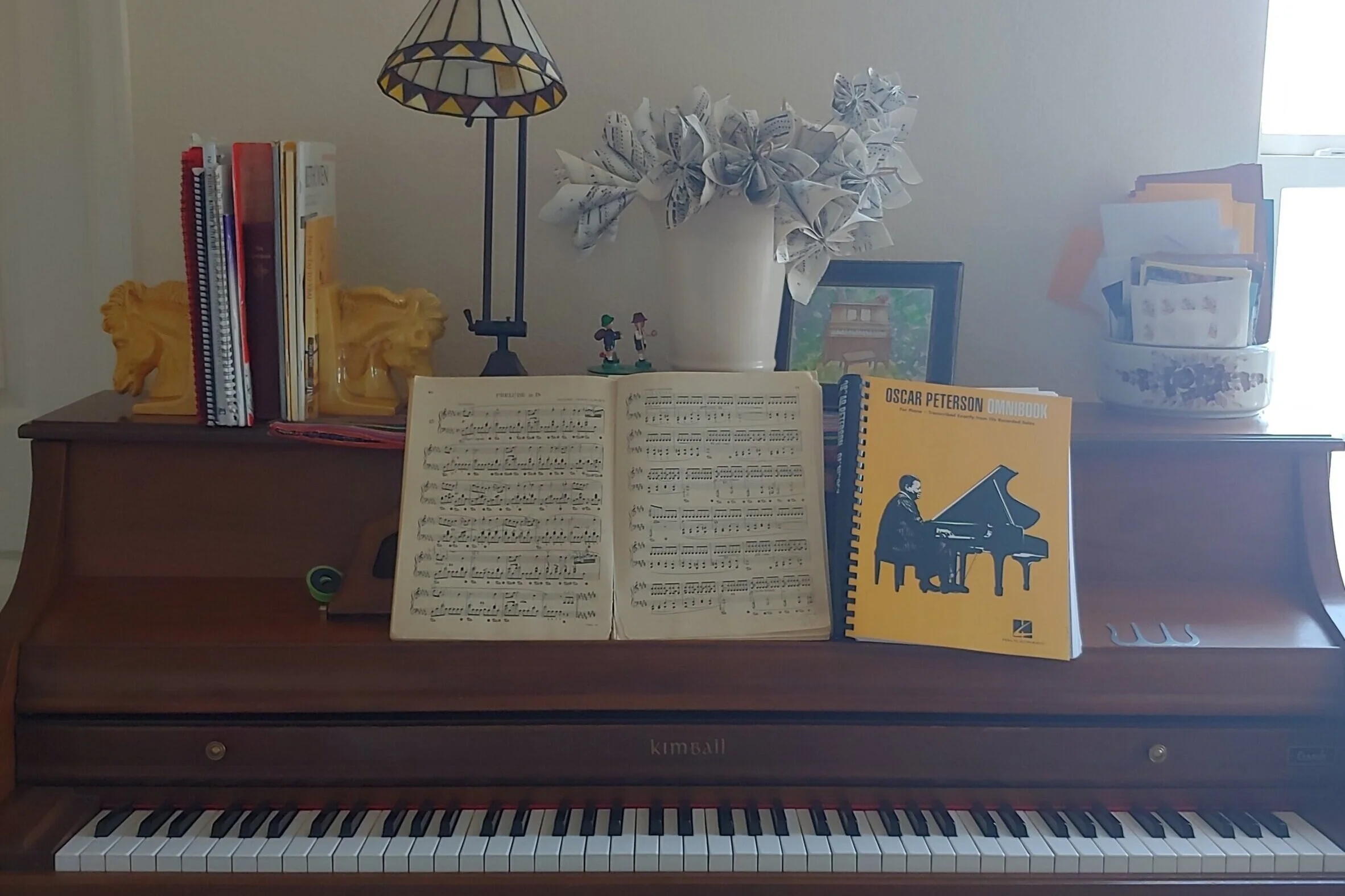I struggle with students who use the word "pitchy" to describe their own sound because it is imprecise, and unhelpful to singers. It is my goal to help people sing better - something I believe anybody can do. These pop culture trends have generated some myths for singers, and would-be singers, and I intend to do my part to dispel them. Everyone deserves to feel like learning to sing is an opportunity available to them, especially if it's something they want to do.
Pitch Perfect
Alright, "Pitch Perfect" is just a comedy. One can't take it too seriously. That is, until singers cite it as an influence on their singing. Don't get me wrong, enjoying musical films is a great way to get turned onto the craft of singing (for me it was "Newsies"), but there are some erroneous assumptions that the movie "Pitch Perfect", in particular, enables. Let me debunk some of these myths about singing that have come into my studio:
1. Perfectly harmonized mash ups of 80's songs can be composed and performed on the spot. Good harmony and voice leading is the work of sensitive and skilled arrangers. In fact, many people have built careers upon arranging well-known songs to suit vocal harmony. These pieces are performed by well-rehearsed choirs under the tutelage of a skilled choral conductor. Sure, bluegrass bands like the Carter Family were known for whipping out pleasing 3-part harmony to old folk tunes, but they were raised to harmonize with one another and furthermore grew up singing the very songs that they later recorded beloved versions of. It just isn't possible that college students with varying backgrounds and little experience working together would do anything like this:
2. To learn a song, you really just need to sing along with the original recording a few times. Listening to a song you love and singing along can sometimes be helpful, but many young singers do not know whether they are singing the correct pitch or not. Matching pitch is not something that comes naturally to everybody, but is something that can be learned with the help of an instructor. Hearing pitch is also an underestimated skill, particularly for singers. Instrumentalists learn to hear pitches as sharp, flat, or centered early on. Guitarists, for example, must learn how to tune their instrument by ear. Singers are at a serious disadvantage because they do not need to press keys or fret strings in order to hit, say, an E. But, knowing whether your pitch is centered is key to interpreting a song well. When you learn a song only by singing along to a recording, you are highly likely to memorize inaccurate rhythms and pitches - something that is far more difficult to undo down the road than to have learned it accurately from the beginning. The movie "Pitch Perfect" never shows any character doing vocal warm-ups, looking at sheet music, or rehearsing parts and adjusting mistakes before hitting the stage. Sure, that would make for a really boring scene in what is in reality a silly movie, but many of my students have erroneously thought that they would be ready to hit the stage after having listened to a song on repeat on their iPods. Nope, real singers work real hard. We're talking about hours and hours of practice. Even your favorite pop stars maintain exhausting schedules of rehearsal and vocal coaching.
3. Great singers either just have "it" or they don't. A few of the main characters in the movie indicate that they have never sung with any kind of group before. They seem to just show up to the auditions with professional sounding voices, and "Wow!" The actors who sing in this movie have all had careers as singers, and have trained many years to be able to do what they do. Not to mention that the actors are all in their mid and late 20's. Even an extraordinarily talented teen will still have to grow into their voice. It takes time, practice, and the assistance of an instructor to discover what your unique voice can do and how you can use it. Furthermore, teens' vocal folds are not fully developed. For women, this won't happen until around the age of 30. For men, vocal folds are said to be developed in their mid 20's. Additionally, I believe that all aspiring singers can learn to sing great no matter the level of natural ability they enter the studio with. Again, time, training and practice are the keys to success.
4. The term "Perfect pitch," means you sing really well. Actually, musicians generally take "perfect pitch" to mean that a person can identify any pitch simply by hearing it, or that they could sing any pitch that is called out. For example, if I played an Eb on a piano without the person looking at my hands, they would correctly identify the pitch. Piano tuners may have perfect pitch. I have met orchestra conductors who had perfect pitch. It is a reflection of a musician so involved in their craft that they have acquired acutely sensitive hearing. To them each possible pitch has a unique and distinct quality that identifies it apart from the other pitches. I think it is important to clarify this special trait that a small number of musicians have. A singer is actually working towards having
accurate pitch, meaning the pitch they are singing sits harmoniously within the harmonic framework the band, or orchestra, is laying down. In other words, when we notice that a note sung sounds very good with the notes the other musicians are playing.
"Pitch Perfect," is an entertaining, humorous film, (although, it's worth noting that the characters of color have little to no importance in the film which is a shame,) but it's not an example of the kind of trajectory one might have in their pursuit of becoming a singer. The film's central plot is to show a singing group preparing for a competition, and that becomes the central problem to aspiring singers who might take a cue from the film - the preparation depicted is nothing like the real thing.
Pitchy
TV shows like "The Voice" and "American Idol" have popularized a word I have come to disdain hearing in my studio:
Pitchy. I began hearing this word about a year ago from students of all ages and wasn't sure what the students meant by it. It's not a particularly specific term and certainly isn't used by any musicians I know. Sometime after hearing this word used by students, I went to my mom's house one night. We watched several episodes of "The Voice" together and I solved the mystery.
I'm not a historian or an etymologist, but I believe the term "pitchy" was invented by Randy Jackson circa 2010.
Let me tease out the problematic implications of powerful music executives throwing this word out on TV as though is were any kind of helpful critique:
1. That the term "pitchy" is synonymous with "off-pitch." In episodes of these singing programs I have watched, judges occasionally use the term pitchy when in fact the singer is not off-pitch, and neglect using it when a singer is off-pitch. This indicates that the judges are not, in fact, helping a singer to know when they are singing slightly off-pitch. It would be helpful for the judges to identity pitch problems for a singer so that the singer could address the specific issue, but the judges seem to be referring to pitch problems only some of the time. Without clarification the singer is woefully lost in how to improve.
2. Confusing the term "pitchy" with a quality of tone production. In many cases, I believe what the judges are trying to communicate to the singer, is that their tone production is poor, or an inappropriate choice for the repertoire. For example, a singer may have an overly nasal tone. Singers on these programs tend to push, or strain, their voices in order to sound louder and this can create a "brassy" or stressed tone, which is not pleasant to the listener. A singer may want to create a different tone for a sad, country ballad than an uptempo pop song. A singer must choose carefully what sort of tone quality the song calls for. Audiences are very perceptive to these details even if they are not able to clearly articulate their tastes and preferences. If something is off, the lay person may be prone to say it sounds "pitchy," but again, this does not help the singer clearly identify the issue in order to correct it.
The solution to the term "pitchy" would be to use more specific critiques and comments with a singer.
1. Singers are frequently off-pitch - even the most famous singers today and in the past were occasionally off-pitch. The voice is a vulnerable instrument and many factors can contribute to the pitch being slightly off. A more helpful critique would be to let the singer know if they are
sharp (a bit high) or
flat (a bit low) so the singer can consciously raise or lower their pitch. Voice teachers are trained to recognize the causes of faulty pitch, whether it is due to breath support (the most common reason), vocal strain, a poor/closed mouth position, or even merely fatigue. By identifying clearly where the pitch is off and the probable cause, a singer can quickly and easily make adjustments.
2. Singers must discover through experience, practice, and the guidance of a vocal coach or teacher, what tones they naturally produce and how they can alter these tones. This is not only a stylistic matter, but a technical one as well. Many young singers are still developing their registers and have not learned how to blend them. This can create poor tone quality as singers try to sing high notes with too much
chest, or low notes with too much
head. Likewise, young singers sometimes do not trust how loud their voice actually is and can be inclined to push their vocal folds beyond their capability. Not only does this produce an unpleasant tone, but it can cause permanent damage to the delicate folds. With appropriate guidance from a teacher or coach, the singer will learn how to rely on physical sensations to create specific tones rather than what they think they hear in their head. A good teacher will make specific suggestions as to a change in posture, mouth, head, tongue, etc. A good teacher will also guide singers through the process of blending registers so that the singer has a stronger control over their own voice.
If you are an aspiring singer, I can't urge you enough to find a voice teacher that you feel compatible with. Don't fall for the modern pop singer mythology - singing takes work, practice, passion and the help of experienced instructors.
Next Steps: Make a bowl of popcorn and enjoy pop movies just for what they are - entertainment.










